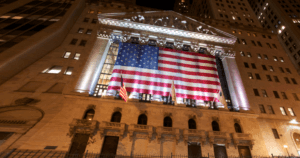Economic Blackout: Will a 24-Hour Boycott Shake Up Corporate America?
A grassroots movement, People’s Union USA, is calling for a 24-hour economic boycott on Friday to protest corporate and political influence. Led by John Schwarz, the initiative urges Americans to avoid spending, especially at major retailers. Additional boycotts against Walmart, Amazon, Nestlé, and General Mills are planned. Other groups, including faith-based organizations, are also targeting Target’s rollback of DEI initiatives. Experts predict limited long-term impact, though past boycotts have had mixed results. Some believe the protest could raise awareness rather than significantly hurt businesses. Others plan to redirect spending to small and minority-owned businesses instead.

Economic Blackout: Will a 24-Hour Boycott Shake Up Corporate America?
A grassroots movement is urging Americans to refrain from spending money on Friday as an act of “economic resistance” against what they perceive as the undue influence of billionaires, large corporations, and the country’s two dominant political parties.
The Initiative Behind the ‘Economic Blackout’
The People’s Union USA, founded by meditation teacher John Schwarz, is organizing the protest, which will take place from midnight to 11:59 p.m. EST. The group encourages participants to avoid making any purchases, especially from major retailers, fast-food chains, and gas stations. In cases of emergencies, supporters are advised to shop at small local businesses and use cash instead of credit or debit cards.
Beyond the one-day event, the organization plans additional boycotts targeting Walmart, Amazon, Nestlé, and General Mills, with another broad-based spending freeze scheduled for March 28. The Amazon boycott specifically includes its subsidiary, Whole Foods.
Other Planned Boycotts
Several other activist groups and faith-based organizations are also organizing boycotts, particularly targeting Target. The retailer, known for its past commitment to diversity and inclusion efforts, recently announced a rollback of its DEI (Diversity, Equity, and Inclusion) initiatives.
- We Are Somebody, led by activist Nina Turner, launched a boycott against Target on February 1 to coincide with Black History Month.
- Reverend Jamal Bryant initiated targetfast.org, encouraging Christians to boycott Target for 40 days starting March 5, aligning with Lent.
- Civil rights leader Reverend Al Sharpton announced his organization, the National Action Network, would identify two companies for boycotts in the coming months over their retreat from DEI commitments.
Sharpton emphasized that while former President Donald Trump could cut federal DEI programs, he could not dictate where people choose to shop.
Potential Impact of the Economic Blackout
Retail analysts suggest that while the blackout may slightly affect some businesses, the overall economic impact is expected to be minimal. Marshal Cohen, chief retail advisor at Circana, noted that in a challenging economic climate with rising food costs, retailers are already under pressure, making any dip in sales more significant. However, he predicts the effects will likely be more pronounced in urban and liberal-leaning areas.
Marketing expert Anna Tuchman from Northwestern University believes the protest will have a temporary impact on daily sales but doubts it will drive long-term economic shifts. She pointed out that past boycotts have had mixed results:
- A 2023 backlash over Target’s Pride Month merchandise led to sales declines, prompting the retailer to scale back its LGBTQ+ collections in the following year.
- A boycott of Goya Foods in 2020 after its CEO praised Trump led to an initial sales boost from conservative consumers, but the effect faded within weeks.
- Bud Light, once America’s top-selling beer, suffered a prolonged sales slump after a partnership with a transgender influencer, showing that boycotts can have lasting effects when consumers have readily available alternatives.
Diverse Reactions to the Boycott
While some individuals plan to participate in the economic blackout, others, like Atlanta-based political consultant Afya Evans, intend to spend strategically—supporting small businesses and Black-owned brands rather than avoiding purchases altogether.
“This is broader than a single issue,” Evans said. “We want to see the impact, let everyone participate, and build from there.”
Check out TimesWordle.com for all the latest news
You must be logged in to post a comment.